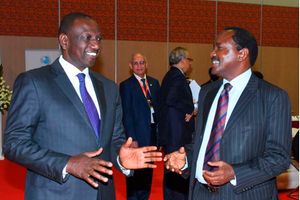BBI battle and the art of the steal

Building Bridges Initiative Secretariat Co-chair Junet Mohamed leads MPs in addressing journalists at BBI Secretariat in Nairobi on February 24,2021 where they thanked County Assemblies throughout the country for passing the BBI bill.
What you need to know:
- Critics say the BBI champions have given or promised groceries to members of the county assembly.
- However, looking back just four months ago, stomachs alone cannot explain the seeming sea change over BBI that we are witnessing.
On so-called “Super Tuesday”, several devolved Kenyan county assemblies approved the Building Bridges Initiative (BBI) Bill, bringing the number that have done so nearly to nearly 40.
The BBI Bill proposes extensive amendments to the country’s much-praised 2010 Constitution. It requires the approval of at least 24 county assemblies for it to proceed to the National Assembly and the Senate. From there, it will go to a referendum some time in the coming months.
BBI is the love child of President Uhuru Kenyatta and Opposition Leader Raila Odinga’s oft-derided “Handshake” of March 8, 2018 following the bitter 2017 election. Raila and his Nasa coalition rejected the outcome and went to court.
The Supreme Court, in an African first, nullified the vote. The months of the campaign and after were dark days for Kenya and a kiss-and-make-up was the last thing most people expected from the two combatants. The Handshake, therefore, blindsided many.
President Kenyatta and former Prime Minister Odinga and their supporters have sold BBI as the panacea for Kenya’s winner-take-all politics and the only way to ensure smaller ethnic groups will ever get to lead a country where power and everything else is dominated by the “big tribes”.
To do that, BBI is full of pork. With a president, deputy president, prime minister and deputy prime ministers, it is the archetypal “more chiefs than Indians” set-up. These pork aspects of it have drawn the most virulent criticism, complicated by the fact that Deputy President William Ruto was, at best, ambivalent about BBI and his camp saw it as little more than a two-penny plot to lock him out of the presidency in 2022.
By November last year, if one followed Kenyan social media, read the newspapers and watched TV news, BBI seemed doomed. The opposition to it appeared insurmountable, and Uhuru and Raila often cut lonely figures. Yet, here we are.
Critics say the BBI champions have given or promised groceries to members of the county assembly (MCAs) and could do the same in the National Assembly and the Senate. Both charges might well turn out to be true.
However, looking back just four months ago, stomachs alone cannot explain the seeming sea change over BBI that we are witnessing. The architects, it seems, understood good old political craft in ways we didn’t comprehend.
Spread it around
There is, as we said, a lot of pork. There are now more big cars, car convoys and trappings of office for the big men and women to come. But pork alone doesn’t always work. For that to happen, you have to spread it around. Beyond the at least five big chiefs, counties will get more constituencies, some significantly more funding, and there are all sorts of things for youth and an attempt at again getting better representation for women in politics.
It is one of the oldest tricks in the book — carrot and stick— and it almost always works. It is all bloated and could be costlier, as critics point out, but at least more people get to get a cut. People might argue against it but, when the vote comes, fellows will always choose to have their piece.
In Uganda in 2005, the country desperately wanted a return to multiparty politics. What did President Yoweri Museveni do? At the referendum for multipartyism, they lumped on a question about scrapping presidential term limits. Rather than reject the package, many democrats held their noses, voted for it to get back multiparty politics, reasoning they would fight to restore term limits in future battles.
Sixteen years later, they are still at it.
The other thing about Kenyan politicians is that they are ground hogs. Unable to deploy the army, and even police, to openly beat down and kill their opponents and supporters, they have learnt how to get down and work the system and exploit the psychology of the people in ways some of their elite critics don’t fully appreciate, and in a manner that politicians where ruling parties are assured of victory before the first vote is cast wouldn’t know how to.
A very bourgeois chap I know was running for political office in Nairobi. Shortly after I moved to the capital city, he had sat me down and told me there was a simple rule to a good life there. If you are not in places like Karen, Muthaiga or Kitisuru, he said, just live on the west side of Uhuru Highway.
I dropped someone at Kenyatta Market to have her hair braided, and as I waited, the chaps around me were all talking about the forthcoming election. I asked a group of them who would win. All told me my friend would. They said he dropped by every evening to buy drinks and nyama choma and then sit to feast with them.
I was stunned. I simply couldn’t picture him sitting in the muddy parking lot eating roast meat with the market proletariat. The election came, and he won! I would never place a bet on Kenyan politics.
Mr Onyango-Obbo is a journalist, writer and curator of the Wall of Great Africans. @cobbo3





